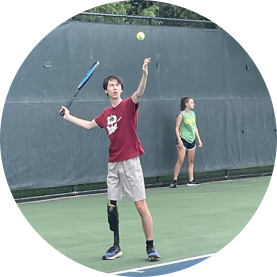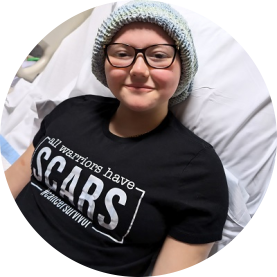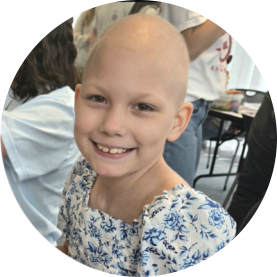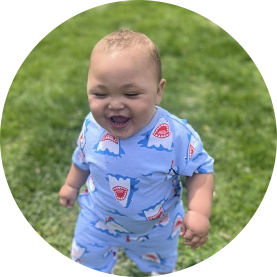- Neuroblastoma


Click the images to see them larger above!
Learn more about
Neuroblastoma
Get the facts about Neuroblastoma and how our research projects are making a difference.
Learn More »Grace Maureen Sprano entered our world just before dawn on December 15, 2007. Just over a month later, on January 21, 2008, she was admitted to INOVA Fairfax Hospital with a painfully distended abdomen. The radiologist looking at her ultrasound paused for a very long time before saying, “I know what it is, and I’ve just been trying to figure out how to tell you.” Grace had cancer. She was diagnosed with Stage IV Neuroblastoma – a fast growing type of cancer which usually starts in the adrenal glands and from there can spread to the liver, bone marrow, lungs and beyond. In Grace’s case the cancer started in her right adrenal gland and quickly spread to her liver and bone marrow. As the weeks wore on, every day brought more and more tests and procedures. Every day Grace’s condition got significantly worse. The tumors in her liver – we were told there were “too many to count” – were growing at an exponential rate, robbing her body of protein and nutrients and more importantly taking up more and more space in her abdomen. The enlarged liver began to push up on her diaphragm, making it difficult for her to expand her lungs. By January 25, just four days after she was diagnosed, Grace’s tiny body could no longer breathe on its own and she was placed on life support.
In the meantime, the doctors had been gathering information in order to determine precisely which type of Neuroblastoma cells they were dealing with. Using a battery of tests, including sophisticated DNA analysis, they were finally able to decide on a treatment plan. The good news for Grace was that her cancer cells did not have all of the characteristics that have been associated with the most drug-resistant form of Neuroblastoma. The doctors knew which chemotherapy drugs to use and they were confident they would kill or at least shrink the tumors. The bad news was that they did not know whether they would work fast enough to save Grace’s life. Even as she started the first 3-day cycle of chemotherapy, her condition continued to deteriorate. By the third day she was on the brink. Her little 6-week-old belly was stretched to 56 cm in diameter, and there was very little room inside for anything but the cancer. The breathing machine needed more and more pressure to force air into her lungs, and her internal abdominal pressure was approaching the point at which her organs would simply shut down. The doctors looked worried. There weren’t many options left, they told us, and those that were available were “not good.” We waited and watched – a life unlived flashing through our minds. Then, slowly at first, the drugs began to work. By the next day the tumors starting shrinking almost as fast as they had grown, and three days later Grace spit out her breathing tube and began to breathe on her own again.
Over the next several months Grace would endure three more cycles of chemotherapy, two major surgeries, four painful bone marrow aspirations, prolonged periods when her immune system was completely wiped out, multiple painful daily injections and other medications, blood transfusions, platelet transfusions and so much more! It was never easy, and there were many long days and even longer nights along the way, but she had survived thus far. On January 22, 2009, a full year and a day after her initial diagnosis, we received the news that Grace’s six month post-chemotherapy scans remained clear. A week later we learned that Grace’s immune system was finally recovered enough for her to withstand some of the vaccinations a “normal” baby would get at birth and at four weeks of age.
In the years that followed, Grace remained in isolation until she was strong enough to further build her immune system. She endured monthly blood draws and urine screens, plus neurological examinations, and eventually transitioned to every three months, then every six months and now yearly examinations. Grace will continue to be followed by her oncology team in order to monitor her NED (no evidence of disease) status. Her treatment protocol requires that she be monitored by the oncologists for the next ten years to make sure the cancer does not return. Grace is now monitored by The Oncology Late Effects Clinic and her pediatrician team. She continues to struggle with yearly pneumonia, and the fact that some of her immunizations simply will not take hold in her little body but she understands her treatment and she continues to be one tough kid.
We are blessed that Grace is full of life. Grace has enjoyed being the “hero” at the 2013 and 2014 ALSF Leadership Academy at Villanova and at other ALSF fundraisers. Grace hopes that her story will help ALSF raise awareness and the funding needed to help more children fighting cancer. Grace’s team—“Race With Grace” —continues to hold Lemonade Stands, attend Hero Family Fundraisers and promote the work of ALSF.
Grace is an active eight year old who loves to read, run, play soccer and swim. She loves spending time with her siblings, Emily (20) and Tucker (11). She currently attends 3rd grade in a Spanish immersion magnet school.
Throughout this long ordeal one thing has been abundantly clear to us: if not for the tremendous progress made in the field of childhood cancer treatment over the last twenty years, our sweet and beautiful baby girl would not be alive today. This progress has only been made possible by years of research generously funded by kind and compassionate people just like you. Please help support Alex’s Lemonade Stand Foundation. On behalf of our daughter and countless others just like her, we thank you.
Written by Alene & Michael Sprano, Grace’s Parents
Updated: September 2016
Read more about Grace Maureen’s SuperSib Emily.
Donate in Honor of Grace Today!
Your donation helps to fund critically-needed research to find better treatments and cures for children with cancer.





